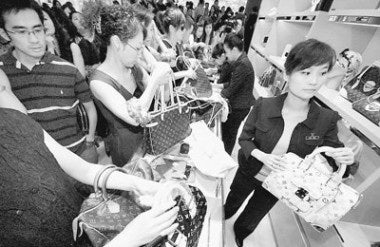Luxury Tax Will Not Be Cut Completely, Instead Set Between 2-15 Percent#

Cutting one tax among many might not be enough to dissuade Hong Kong-bound tourist-shoppers
Last week, Jing Daily reported on Beijing's plans to reduce the country's stiff luxury tax, in an attempt to boost domestic spending on high-end goods and ensure that some of the billions that mainland Chinese shoppers spend in Hong Kong, Europe or North America stay closer to home. While the news sent shockwaves through the Chinese- and English-language media, with Business Insider proclaiming the move would "unleash [China's] super-rich", a report from Chongqing this week finds consumers there less than enthusiastic about the planned moves.
As the Chinese government clarified this week, the tax moves will not do away with the luxury tax altogether, but will rather decrease it to anywhere from two to 15 percent, depending on the product. Also, the program will not kick off all at once, but will be rolled out gradually, starting with tax cuts for cosmetics, tobacco and alcohol. In Chongqing, one of China's fastest-growing luxury markets, consumers have given the news a cool reaction, mainly due to the fact that they don't actually feel the tax cut will save them that much money, compared to simply heading to Hong Kong or Macau. As the Chongqing Evening News reported, store managers at one of the city's luxury malls were unable to give journalists a sense of exactly how the tax cut would affect their pricing, and shoppers said they believe luxury goods will still be much cheaper outside of China, so they'll find it "very difficult" to start buying locally.
While the opinions of some shoppers in Chongqing might meet with a collective shrug, it's important to keep in mind that Chongqing -- a municipality larger than Taiwan and nearly as populous as Canada -- is among China's richest cities and has become a magnet for expanding luxury brands. As Xinmin pointed out earlier this year, Chongqing is a larger market for Armani than Hong Kong or Macau, and the municipality has emerged as MaxMara's third-largest China market. Chongqing, Xinmin added, is "trendy, but not trendsetting; occasionally provocative, but not extravagant...In Chongqing, the elegant and the vulgar coexist."
Though they're an attractive demographic, many Chongqing luxury consumers are already seasoned professionals in terms of understanding the price gap between mainland China and Hong Kong. This means few of the shoppers interviewed by the Evening News were swayed by the idea of a luxury tax reduction, as they pointed out that the luxury tax is only one of several fees tacked on to imported high-end goods. After customs inspections, in-store testing, VAT, sales and other consumption taxes are worked into the equation, prices can be more than one-third higher than in the product's country of origin. Reducing the luxury tax, while failing to cut it completely, may increase sales of some cosmetic and tobacco products, but when it comes to shoes, handbags and apparel, the other multifarious taxes imposed on these products will likely continue to turn off many potential buyers.
"I won't come back to Chongqing to shop just because prices will go down a bit," one shopper, surnamed Tan, told the Evening News, adding that even if luxury taxes are reduced, prices will remain far higher in Chongqing than in Hong Kong or Macau. Currently, Ms. Tan said, if a given luxury handbag costs 10,000 yuan in Chongqing, it'll sell for 6,000-7,000 yuan in Hong Kong. Similarly, a Swiss watch selling for 20,000 yuan in Macau goes for well over 30,000 yuan, and sunglasses that cost 1,000 yuan sell for more than 3,000 yuan.
This sentiment was shared by most of the shoppers questioned by the newspaper, which wrote, "[shoppers] explained that even if Chongqing's luxury taxes are reduced, products still remain high, and they won't be enticed to buy locally. As one shopper said, "Buying luxury goods overseas isn't just about getting things cheaper. More importantly, it's about [having] a memorable experience." Still, several store owners interviewed by the Evening News expressed optimism about the luxury tax cuts, saying that the tax is one of the main reasons luxury goods are 20-30 percent cheaper in Hong Kong or Macau, and that they feel local shoppers will respond favorably to the expected price reductions.
In this case, it's probably best to take the luxury tax reduction plans with a grain of salt. Some mainland Chinese consumers, likely those who only make one or two high-end purchases per year after saving up for several months, will see the reductions as enough to outweigh the price of a trip to Hong Kong and will buy locally. But, as several of the Chongqing residents interviewed this week hinted, the reduction of one tax among many simply won't be enough for savvy consumers accustomed to shopping sprees in duty-free Hong Kong or Macau.